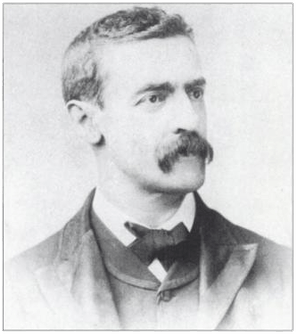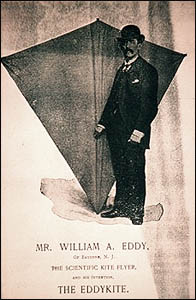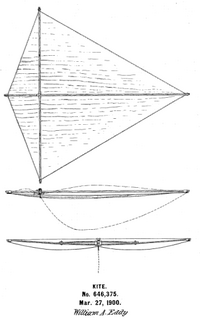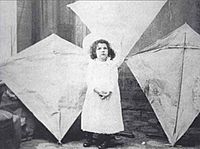William Abner Eddy facts for kids
William Abner Eddy (born January 28, 1850 – died December 26, 1909) was an American accountant and journalist. He became famous for his exciting experiments using kites to take photos and study the weather.
Even though new types of kites came along, Eddy's improvements were very important for a while. In fact, a year after he passed away, a line of ten of his kites flew incredibly high. They reached an altitude of 23,385 feet (about 7,128 meters)! This set a world record for kite height that lasted for many years.
William Eddy's Life Story
Growing Up
William A. Eddy was born into a wealthy family in New York City. His father was a reverend. William's interest in kites started when he was quite young. When he was just 15, he managed to tie a lantern to a hexagonal kite and fly it successfully.
After finishing his studies at the University of Chicago, he moved back to New York. Soon after, he began working as an accountant for the The New York Herald newspaper.
His Amazing Kite Adventures
It seems William Eddy's passion for kites grew stronger when he heard about new discoveries. In 1883, a person named Douglas Archibald used kites to measure how fast the wind was blowing at different heights. Another scientist, Alexander McAdie, even repeated Benjamin Franklin's famous kite experiments.
In 1887, Eddy learned about Woodbridge Davis's kites, which could be steered. He also heard about tailless diamond kites from Java. These kites didn't need a tail for balance, which was a big deal. Tails made it hard to connect many kites together to fly them higher.
Eddy worked hard to figure out how these tailless kites worked. He added a bend to the crossbar and a small hole where the sticks met. These changes helped his kites stay stable without a tail.
In 1893, the World's Columbian Exposition (a big world fair) gave him a chance. He got an actual Malay kite, which gave him even more ideas. This led to the design we now call the diamond Eddy kite.
He also made a better way to connect several kites. Before, each kite was tied directly to the one before it. Eddy changed this. He made each kite's line branch off a main, stronger line. This made it easier to fly many kites at once.
Eddy started publishing the air temperatures he measured with his kites. This caught the attention of the American Meteorological Society, a group that studies weather. In 1894, they invited him to help at the Blue Hill Meteorological Observatory. He fixed their technical problems, which really helped the observatory's reputation.
On May 30, 1895, William Eddy achieved something amazing. He took the first ever aerial photograph in the Americas! This was 37 years after Nadar took the first photos from a hot air balloon. It was also 7 years after Arthur Batut took the first photos from a kite. Eddy made Batut's method even better. He even tried using kites for telephone calls and for holding mirrors high in the sky!
The The New York Times newspaper often wrote about Eddy's interesting adventures and discoveries. For example, in 1897, children playing at night accidentally messed up his experiments. In 1898, he hoped to help the navy during the Spanish–American War with his kites.
On Christmas Day in 1900, he used his kites to observe wild ducks. He found they were flying at 47 miles per hour (about 76 km/h) at an altitude of 1,500 feet (about 457 meters). In 1908, Eddy even used kite photos to solve a mystery! Someone was stealing ice cream from his back porch. One photo showed two men eating all of it!
Family Life
In 1887, William Eddy married Cynthia S. Huggins (1856–1922). They moved to Bayonne, New Jersey, where his cousin already lived. Their daughter, Margaret, was born on January 11, 1888, in New York City.
 | Tommie Smith |
 | Simone Manuel |
 | Shani Davis |
 | Simone Biles |
 | Alice Coachman |





